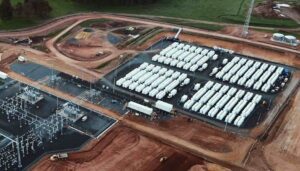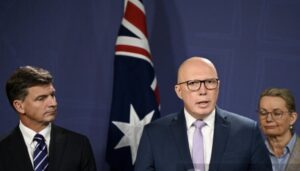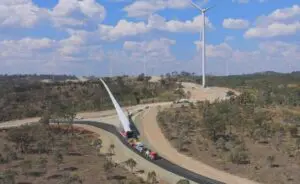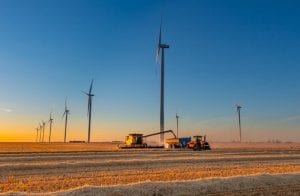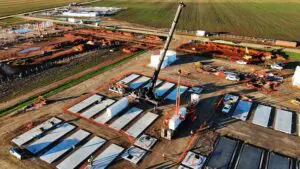President Barack Obama has used his second (and final) inauguration speech to commit his government to finally taking action on climate change.
In an about turn from his election campaign, and public statements for much of the past 12 months, Obama made climate change – and gay equality – the centerpieces of his speech to the nation.
“We, the people, still believe that our obligations as Americans are not just to ourselves, but to all posterity,” he said “We will respond to the threat of climate change, knowing that the failure to do so would betray our children and future generations.
“Some may still deny the overwhelming judgment of science, but none can avoid the devastating impact of raging fires, and crippling drought, and more powerful storms. The path towards sustainable energy sources will be long and sometimes difficult. But America cannot resist this transition. We must lead it.
“We cannot cede to other nations the technology that will power new jobs and new industries. We must claim its promise. That’s how we will maintain our economic vitality and our national treasure, our forests and waterways, our crop lands and snow-capped peaks. That is how we will preserve our planet, commanded to our care by God. That’s what will lend meaning to the creed our fathers once declared.”
It’s a welcome development. But before we get too excited, however, let’s cast our minds back to Obama’s first inauguration speech in 2009, where he had this to say: “We will restore science to its rightful place, and wield technology’s wonders to raise healthcare’s quality and lower its cost. We will harness the sun and the winds and the soil to fuel our cars and run our factories.”
This promise of a “Green New Deal” and the economic imperative of investing in new and clean energy technologies was a constant refrain through his first year in office, the positioning of the US at the disastrous Copenhagen climate change negotiations and in his state of the union address in subsequent years.
In the 2010 state of the union address, Obama even gave clean and renewable energy more mentions than God, healthcare, and the wars in Iraq and Afghanistan, and he repeated his contention that the nation that led the clean energy economy would lead the global economy in the 21st century.
He had reason for concern. The US, as he repeated often, was not just in danger of being left behind in the clean energy race by China, but also by Germany, India, Japan and Brazil. The US, he said then, was stuck in a state of inertia, watching the manufacturing jobs of the future go overseas. “China is not waiting to revamp its economy.” Neither were Germany or India. “They’re not standing still. They’re putting more emphasis on math and
In the State of the Union address in 2011, he was at it again, speaking of the nation’s Sputnik moment – in reference to the early years of the space race – lamenting the fact that the world’s largest private solar R&D facility was being located in China, and that the solar panels that once adorned the White House, and were stripped away by Reagan, were now a central feature of a solar museum in China’s solar capital – a testament to the folly of that nation’s nearest rival. ”Instead of subsidising yesterday’s energy, let’s invest in tomorrow’s.”
So far, that hasn’t worked. Frustrated by unrelenting opposition from conservative forces in Congress, the US is still easily outspent on clean energy by China – the wind industry has been restrained by a “will it, or won’t it” wait for Congress to renew annual tax credits, and the solar industry has been strangled by so many planning restrictions that is some regions it is more expensive to go through the red tape than it is to buy the modules.
So, will this time round be any different? We might get a clearer idea in the upcoming state of the union address when Obama goes into more policy specifics.
The “energy green team” that Obama assembled is now being dismantled. Ken Salazar, the interior secretary who did so much to open up public lands to renewables, is stepping down. Energy Secretary Stephen Chu, who supported an expensive loan guarantee program and the SunShot initiative is also expected to stand down. So is secretary of state Hilary Clinton, but she is likely to be replaced by former Presidential candidate John Kerry, a noted climate hawk.
So there is some reason for hope. This is the first time Obama has spoken so expansively about climate change, per se, in such a set piece. And while his efforts, and his political capital, in the first term were exhausted by the fight over Obamacare, he has no such concerns this time round. His stance on guns, and the debt issues, suggests he is more willing to use the strength of his office. And he does not need to worry about his re-election.
But, as Paul Krugman noted in a blog at the New York Times, Obama, faces “an implacable, irrational opposition, together with a forceful defense of progressive values.”
But he noted that Obama has never been this clear before about what he stands for.
“What it means in terms of actual politics and policy is anyone’s guess, although my guess is not much: the GOP majority in the House will still block everything it can, and unless Democrats regain the House next year in a huge upset, that puts a lid on what can be achieved. Still, we’re starting off on the right note.”
Andy Revkin noted in another blog on the NYT: “This speech is just the start, and a sketch. There’s time for Obama and his administration to refine their approach and goals. (There’s also time for the administration to reconsider an approach taken on climate discussions last week, when the White House, according to Reuters, asked that a session on global warming with a group of mayors not be public.)”
When vice-president Joe Biden visited the “Green inauguration ball”, he told activists to “keep the faith.” As Bill McKibben, the founder of the 350.org, tweeted today: “Obama sounded good on climate. We’ll see.”



